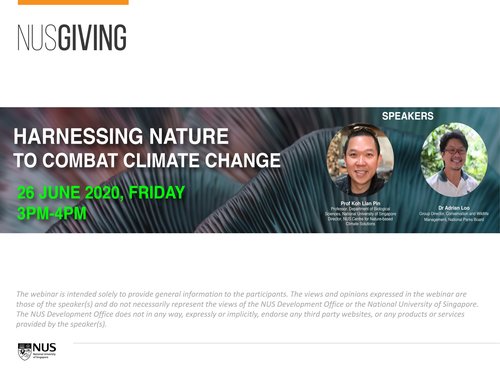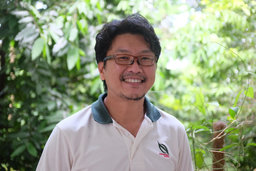In a matter of months, the world has been transformed due to COVID-19, but how long will these impacts on the environment last?

Globally, as people around the world are staying at home in a bid to contain the spread of COVID-19, several positive impacts on the environment have been reported – a drop in greenhouse gas emissions, improvements in air and water quality and more sightings of wildlife in urban areas.
In a matter of months, the world has been transformed, but how long will these impacts on the environment last?
During the NUS Giving Webinar titled Harnessing Nature to Combat Climate Change, experts weighed in on the effects of COVID-19 on the environment, climate challenges in the longer term and the exciting new environmental initiatives that they are working on in Singapore.

Professor Koh Lian Pin, Professor of Conservation Science, Technology and Policy in the Department of Biological Sciences and Director of the NUS Centre for Nature-based Climate Solutions
“Unfortunately, even if real, the positive impacts of COVID-19 on the environment are likely to be only temporary”, shared Professor Koh Lian Pin, Professor of Conservation Science, Technology and Policy in the Department of Biological Sciences and Director of the NUS Centre for Nature-based Climate Solutions.
“After the crisis, there is likely to be a rebound effect on fossil fuels and greenhouse gas emissions as nations focus on the quickest path to economic recovery. Global climate has been on a warming trajectory for quite some time now and especially during the last four decades,” Prof Koh elaborated.
Prof Koh then introduced the idea of harnessing nature to tackle climate change. Offering a silver lining to the climate change raincloud, nature-based climate solutions can either store or remove carbon from the atmosphere to provide climate mitigation.
“Partnerships too, play a key role in tackling climate change in Singapore, especially with philanthropists, who are the catalyst for kickstarting high-risk, high-reward, innovative and disruptive new ideas and solutions,” he added.
“At the NUS Centre for Nature-based Climate Solutions, we want to address knowledge gaps, build capacity and to deliver pragmatic solutions and innovations,” Prof Koh outlined. The new Centre, set up in 2020 and led by Prof Koh, aims to spur efforts in tackling the challenges of climate change by protecting and better managing natural ecosystems.

Dr Adrian Loo, Group Director of Conservation and Wildlife Management at National Parks Board
This notion of utilising nature-based climate solutions to help mitigate climate change was echoed by Dr Adrian Loo, Group Director of Conservation and Wildlife Management at National Parks Board.
Sharing an overview of the new City in Nature initiative aimed at restoring nature back into the urban landscape that is spearheaded by the National Parks Board, Dr Adrian Loo highlighted that nature-based solutions can help reduce the impact of climate change and build resilience in Singapore.
Key developments for City in Nature will include extending our Nature Park Network, intensifying nature in our gardens and parks, restoring nature into the urban landscape and strengthening connectivity between our green spaces.
“With over 50 years of greening in Singapore, City in Nature is not something that we are starting from scratch. It is progressing the initial vision of a Garden City to the idea of a City in Nature, which imagines the city state of Singapore enveloped in nature” Dr Adrian Loo pointed out.
“Everyone has a role to play and we are inviting citizens to be involved in the planning as well – to participate in the design, development, landscaping and programming of our parks through our Friends of the Parks programme. Ultimately, we hope City in Nature not only helps mitigate climate change but leads to a more caring and gracious society,” concluded Dr Adrian Loo.
For further information on the NUS Webinar Series, contact the Events team at dvoevents@nus.edu.sg.






